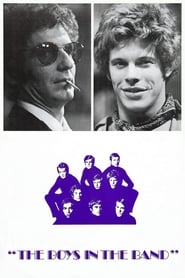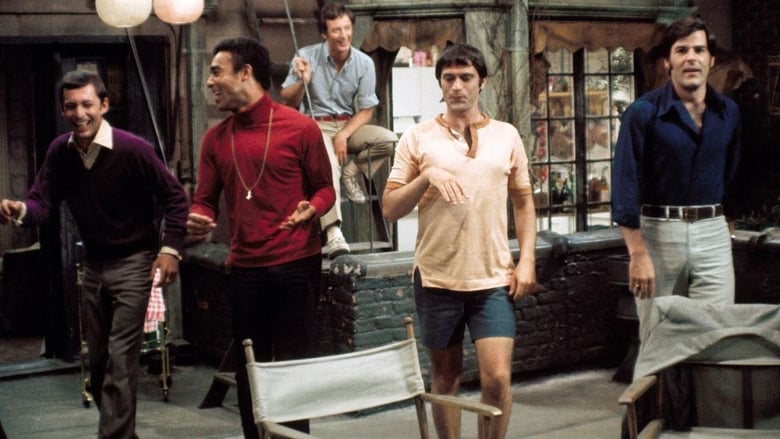“The Boys in the Band 1970” is a gritty, groundbreaking drama that explores the complexities of gay relationships. Set during a birthday party in 1968, the film follows a group of friends as they confront their inner demons and grapple with issues of identity, loyalty, and love. With its searing dialogue and unflinching portrayal of queer life, “The Boys in the Band 1970” is a landmark film that paved the way for future LGBTQ+ storytelling.

⇣⇣⇣
Review
In 1968, the taboo-busting play “The Boys in the Band” premiered off-Broadway to shock and awe. The story follows a group of gay friends who gather for a birthday party that quickly turns into emotional chaos. The raw realism of the play was revolutionary, portraying gay characters without glamorous Hollywood stereotypes. Now, over fifty years later, the play has been adapted into a movie by director Joe Mantello and screenwriter Mart Crowley and is available on Netflix.
The plot revolves around Michael (Jim Parsons), a self-loathing alcoholic who throws a birthday party for his friend Harold (Zachary Quinto). As the night progresses, tensions boil over as secrets are revealed and long-held resentments come to light. But at its core, “The Boys in the Band” is about more than just this one night; it’s a powerful exploration of identity, shame, and societal oppression.
The cast is made up of an all-star ensemble of openly gay actors including Jim Parsons, Zachary Quinto, Matt Bomer, Andrew Rannells, Charlie Carver, Robin de Jesus, Tuc Watkins, Brian Hutchison and Michael Benjamin Washington. Each actor brings their unique perspective and experiences to their roles. It’s clear that they share a deep connection to the material.
One standout moment comes from Michael Benjamin Washington’s character Bernard. In one scene he shares his experience as a Black man in the gay community during the Civil Rights era: “I am not just black or gay; I am black and gay…and sometimes it feels like both of my communities are trying to hold me underwater at the same time.”
“The Boys in the Band” also sheds light on how far we’ve come as a society since its original debut in 1968. While we still have a long way to go regarding LGBTQ+ rights and acceptance globally – there are now openly queer politicians in positions of power – something unfathomable at the time the play was written.
Despite its groundbreaking legacy, some criticized the film adaptation as being outdated and overly negative in its portrayal of gay life. Others argue that it remains relevant today, shining a light on the struggles of shame and self-hatred in a community that still faces prejudice and hatred.
The film’s cinematography is stunning, with incredible attention paid to capturing the mood and tone of each scene. The editing is seamless, allowing the actors’ performances to shine brightly.
The score is also a standout aspect of the movie, featuring classic songs such as Dusty Springfield’s “The Look of Love” and “Apache” by The Shadows. These songs not only add to the ambiance but also serve as nostalgic nods to the era in which it’s set.
Overall, “The Boys in the Band” is an emotionally charged film that refuses to shy away from exploring difficult themes. It celebrates queer culture over fifty years after its inception by presenting authentic, imperfect characters who are flawed yet relatable. It may not be a feel-good movie but it encourages us all to embrace ourselves fully – regardless of our sexuality or gender – and love who we truly are.
Technical Data

- Runtime : 118
- Release : 1970-03-16
- Genre : Drama
- Cast : Kenneth Nelson as Michael, Leonard Frey as Harold, Peter White as Alan McCarthy, Cliff Gorman as Emory, Frederick Combs as Donald
- Crew : Gerald B. Greenberg as Editor, Kenneth Utt as Producer, Carl Lerner as Editor, Jack Fitzstephens as Sound Editor, Robert Jiras as Producer
- Popularity 9.239
- Budget : $5,500,000
- Revenue : $3,500,000
- Company : Leo Films, Cinema Center Films
- Summary : A witty, perceptive and devastating look at the personal agendas and suppressed revelations swirling among a group of gay men in Manhattan. Harold is celebrating a birthday, and his friend Michael has drafted some other friends to help commemorate the event. As the evening progresses, the alcohol flows, the knives come out, and Michael’s demand that the group participate in a devious telephone game, unleashing dormant and unspoken emotions.
- Tagline : Extraordinary. Groundbreaking. Controversial.
